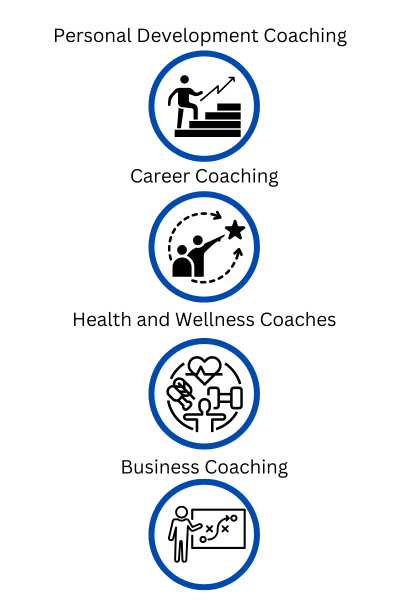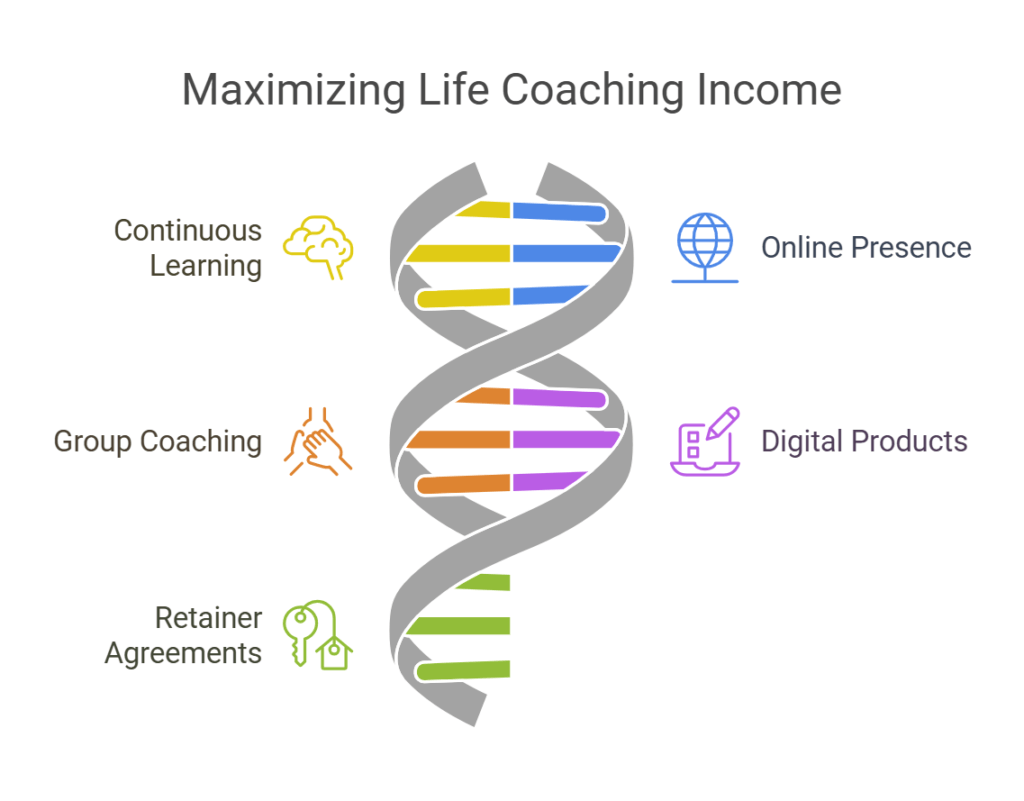Life coaching is more than just a career—it’s a calling to help others live their best lives. As more people seek guidance to achieve their goals, the demand for life coaches has soared. If you’ve ever wondered if life coaching could be both fulfilling and financially rewarding, you’re not alone. In fact, the life coaching industry is now worth billions of dollars, with many coaches earning well over $60,000 a year.
But, how much can you really earn as a life coach? And what steps can you take to increase your income? That’s what this guide is here to explore. We’ll dive into the numbers, look at factors that affect your earnings, and share practical tips to help you boost your income.
Whether you’re considering becoming a life coach or already one, this guide will provide straightforward advice that you can use right away. From setting your rates to growing your business, every piece of information is aimed at helping you make informed decisions and thrive in this exciting career.
What is Life Coaching?
Life coaching is like having a personal guide who helps you reach your full potential. It’s a process where a coach works with you to clarify your goals, tackle challenges, and create a clear plan to achieve what matters most to you. Whether you’re looking to grow personally, advance in your career, or improve your health, a life coach is there to support you every step of the way.
Think of life coaching as a GPS for your life. Just as a GPS helps you find the best route to your destination, a life coach helps you chart a course for your goals, providing direction and encouragement when you hit roadblocks. And just like a good GPS, a life coach helps you course-correct when things don’t go as planned.
Core Functions of Life Coaching
At its heart, life coaching focuses on guiding you toward meaningful changes. Here are some of the key ways a life coach supports your growth:
- Clarifying Goals: A life coach helps you get clear on what you really want. Whether it’s improving your career, relationships, or personal well-being, setting specific, achievable goals is the first step.
- Accountability Partner: We all have good intentions, but staying committed can be tough. A life coach holds you accountable, ensuring you stay on track and follow through on your plans.
- Breaking Through Obstacles: Everyone faces challenges. Whether it’s self-doubt, time management issues, or fear of failure, a coach helps you find practical ways to overcome these barriers.
- Action Planning: Success doesn’t happen by accident. A life coach helps you break down your goals into small, actionable steps, making even the biggest goals feel manageable.
Types of Life Coaching
Different people have different needs, which is why life coaches often specialize in specific areas. Here are some common types of life coaching:

Personal Development Coaching
This type of coaching focuses on helping you become the best version of yourself. Maybe you want to boost your confidence, improve your relationships, or just feel more fulfilled. Personal development coaches help you grow in ways that are meaningful to you.
For example, imagine you’ve always wanted to be more assertive in your life, but you’re not sure where to start. A personal development coach would work with you to develop practical strategies to build that confidence step by step.
Career Coaching
If you feel stuck in your job or unsure about your career path, career coaching could be a game changer. Career coaches guide you through finding the right job, preparing for interviews, or advancing in your current position. They help you discover what you’re truly passionate about and how to make that a reality in your professional life.
Health and Wellness Coaching
Health and wellness coaches focus on improving your overall well-being, both physically and mentally. Whether your goal is to lose weight, manage stress, or create healthier habits, these coaches provide support and structure to keep you on track.
Picture someone trying to build a consistent workout routine but struggling to stay motivated. A health and wellness coach would offer personalized advice, encouragement, and strategies to keep them moving forward.
Business Coaching
For entrepreneurs and business owners, business coaching can be a key to success. Business coaches help you grow your business, improve leadership skills, and make smarter decisions. Whether it’s developing a business plan, managing a team, or increasing profits, a business coach brings clarity and focus to your work.
Imagine a business owner feeling overwhelmed by the pressures of managing their company. A business coach would step in to help them prioritize tasks, delegate responsibilities, and focus on long-term growth.
How Much Do Life Coaches Earn on Average?
If you’re thinking about becoming a life coach or already are one, the big question on your mind might be, “How much can I really earn?” The answer depends on factors like your experience, niche, and location. But the great news is that life coaching can be a highly rewarding career, both personally and financially.
General Overview
When starting out, life coaches typically earn between $25,000 and $40,000 a year. While these early days are all about building your client base and gaining confidence, it’s also where you lay the foundation for future growth.
With a few years of experience, life coaches can make anywhere from $50,000 to $75,000 annually. This is where most coaches find their stride, often specializing in a niche or developing a signature coaching style that attracts steady clients.
At the top end, experienced coaches who have established a strong reputation and work with high-profile clients can earn $100,000 or more per year. Some even bring in $200,000 or higher, especially if they offer group coaching, workshops, or online programs.
Global Overview
The amount you earn as a life coach can also depend on where you live and work. For example:
- In the United States, coaches typically earn between $50,000 and $100,000 per year.
- In the UK, life coaches generally make around £30,000 to £60,000 annually.
- In Australia, annual earnings for life coaches range from AUD 50,000 to AUD 80,000.
Of course, these numbers can rise significantly if you specialize in executive coaching, business coaching, or other high-demand areas. Coaches in large cities or those working with corporate clients often charge more than those serving individuals.
Hourly Rates
Many life coaches charge by the hour, particularly when starting their practice. Here’s what you can expect:
- Entry-level coaches often charge between $50 to $150 per hour. This range allows new coaches to build their experience while still offering valuable guidance to clients.
- Experienced coaches typically charge $150 to $300 per hour, reflecting their expertise and the results they deliver.
- Top-tier coaches—those who specialize in high-demand areas like business coaching—can charge upwards of $500 per hour. These coaches often work with executives or companies looking for specific, results-driven strategies.
It’s common for life coaches to offer packages or long-term programs that provide a steady income. These options also make it easier for clients to commit to working with a coach for extended periods, leading to deeper transformation and better results.
Factors That Influence Life Coaching Income
When it comes to earning as a life coach, several factors can impact how much you make. Your experience, niche, clients, location, and personal brand all play a role in determining your income. Let’s break these down to help you understand how to boost your earning potential as a coach.
Experience and Credentials
The more experience you gain, the more you can charge. Like any career, as you help more clients and see the positive changes in their lives, your value grows. Coaches who have been in the field longer and have a track record of success often earn significantly more than those just starting out.
Certification is another way to build trust with potential clients. Life coaches with recognized credentials, like those from the International Coaching Federation (ICF), tend to earn more. It’s not just about the title, though—it’s the confidence that clients feel knowing they’re working with someone qualified and credible.
Niche Specialization
Specializing in a specific area of life coaching can dramatically increase your income. When you focus on a niche—whether it’s executive coaching, career coaching, or health and wellness coaching—you position yourself as an expert in that field.
Think of it like going to a specialist doctor rather than a general practitioner. Clients in need of a specific solution are willing to pay more for your specialized knowledge and insights. For example, executive coaches often work with high-level professionals, which means they can command higher fees due to the high-impact results they offer.
Clientele: Corporate vs. Individuals
Who you coach also plays a big part in your earnings. Working with corporate clients tends to bring in higher pay compared to coaching individuals. Companies often have larger budgets and see life coaching as an investment in their employees’ performance, productivity, and well-being.
For instance, if you offer leadership coaching to executives or team coaching to improve company culture, you can often charge premium rates. On the other hand, coaching individuals—while rewarding—might come with smaller budgets but still offers consistent income and long-term client relationships.
Geographic Location
Where you are (and where your clients are) can affect how much you earn as a life coach. Coaches working in big cities or affluent areas often charge more simply because of the cost of living and the higher expectations of clients in those regions.
That said, with more coaches offering virtual sessions, you’re no longer limited by geography. You can coach clients from all over the world, adjusting your rates based on the market they’re in. This flexibility allows you to reach a broader audience while potentially earning more.
Marketing and Branding
In life coaching, your personal brand is everything. A strong online presence, whether through a professional website, active social media accounts, or content like blogs and videos, can set you apart from other coaches. The more visible and credible you appear, the higher the rates you can charge.
Think of marketing as planting seeds. Every post, article, or testimonial is a chance to show people the value you bring. Over time, this builds trust and helps potential clients see why you’re worth the investment.
How to Maximize Your Life Coaching Income
As a life coach, your potential to earn doesn’t just depend on working more hours—it’s about being smart with your time and expanding your services in ways that make sense for you and your clients. Whether you’re just starting out or looking to scale up, here are five strategies that can help you boost your income and make a bigger impact.

Continuous Learning
Investing in yourself is one of the most reliable ways to increase your value as a coach. Advanced certifications, like those offered by the International Coaching Federation (ICF) or specialized training in Neuro-Linguistic Programming (NLP), not only sharpen your skills but also give you an edge over other coaches.
Think about it: clients are more likely to pay higher fees when they know they’re working with someone who brings extra knowledge to the table. For example, a coach who has undergone NLP training can offer unique strategies for personal development that many other coaches simply can’t. It’s like having more tools in your toolbox, which helps you deliver better results for your clients—and charge more for it.
Building an Online Presence
Having a strong online presence is no longer optional if you want to grow your coaching business. A professional website acts as your digital storefront, showing potential clients who you are, what you offer, and how you can help them. It’s the first place they’ll look to learn more about you, so it’s important to make a great impression.
Beyond your website, engaging on social media and sharing helpful content—whether it’s blog posts, videos, or tips—builds trust with your audience. When potential clients see you providing valuable advice, they’re more likely to see you as an expert and feel confident paying for your services.
Group Coaching and Workshops
One-on-one coaching is great, but it limits how many people you can help at once. Offering group coaching or running workshops can change that. With group sessions, you can coach several clients at the same time, which not only increases your income per session but also creates a more dynamic learning environment. Participants often learn just as much from each other as they do from you.
Running workshops or webinars—whether online or in-person—gives you another way to reach a wider audience. Imagine hosting a workshop where dozens of participants sign up. That’s income that grows without needing extra hours in your day.
Selling Digital Products
Creating digital products, such as online courses, eBooks, or even coaching templates, allows you to earn money while you sleep. These resources give your clients the flexibility to learn on their own time and offer you a way to reach a global audience without being tied to one-on-one sessions.
For example, an online course on mastering stress management or setting achievable goals can be sold multiple times, providing ongoing income without additional effort. It’s a great way to help more people while building a steady stream of passive income.
Retainer Agreements
Securing long-term contracts through retainer agreements ensures you have a steady income each month. Instead of charging for individual sessions, offer packages where clients commit to several months of coaching. This creates consistency for both you and your clients, giving them the time they need to see real transformation while ensuring you have reliable income.
With a retainer, you’re building long-term relationships that not only pay off financially but also lead to deeper, more meaningful work with your clients.
Life Coaching as a Full-Time vs. Part-Time Career
Choosing between becoming a full-time life coach or keeping it as a part-time venture depends on your goals, lifestyle, and income expectations. Both paths have their advantages and challenges, and it’s important to weigh them before making a decision. Below is a detailed comparison of full-time vs. part-time life coaching, followed by tips on how to smoothly transition from part-time to full-time coaching.
Full-Time Coaching
Becoming a full-time life coach offers the freedom to dedicate all of your working hours to growing your practice and helping clients. The potential income is significantly higher, especially as you gain experience and build your reputation.
- Income: Full-time coaches often earn between $50,000 to $100,000+ per year, with top coaches earning even more, particularly if they specialize in areas like executive coaching or corporate training. As a full-time coach, you also have the flexibility to add additional revenue streams such as group coaching, workshops, or online courses.
- Lifestyle: The ability to set your own hours is one of the biggest lifestyle perks of full-time coaching. However, this comes with a catch—there’s also the pressure to continuously attract clients and market your services. You’ll need to balance your time between coaching, client management, and growing your business, which can feel overwhelming at times.
- Fulfillment: The personal satisfaction of helping clients full-time can be immensely rewarding. The depth of transformation you can offer is greater because you have more time to build strong, lasting relationships with your clients.
Part-Time Coaching
Many life coaches start their careers part-time, balancing their coaching with another job. This can be a great way to test the waters and gain experience without the full financial risk of jumping straight into full-time coaching.
- Income: The income for part-time coaches is typically between $20,000 to $40,000 per year, depending on the hours worked. Since you’re working fewer hours, your earning potential is limited, but it can still provide a nice supplemental income.
- Lifestyle: The biggest advantage of part-time coaching is flexibility. You can maintain the security of your main job while slowly building your client base on the side. This reduces financial pressure, but you may find that your focus is split between your job and coaching, which can limit your growth as a coach.
- Fulfillment: While part-time coaching is fulfilling, it can be challenging to dedicate the attention needed for deep client transformations. Your sessions may feel rushed, or you may not have enough time to offer ongoing support.
Transitioning from Part-Time to Full-Time Coaching
For many coaches, the ultimate goal is to transition from part-time coaching into a full-time career. Here’s how you can gradually make that shift:
- Build a Strong Client Base: Before making the leap, ensure you have a steady stream of clients. Aim to have at least 50-70% of the income you would need from coaching already in place while you’re still working part-time.
- Increase Marketing Efforts: As you grow your client base, invest more time in marketing. This includes enhancing your online presence, creating content, and networking. Focus on building your personal brand and reputation.
- Develop Multiple Income Streams: Consider adding additional revenue streams, like group coaching, online courses, or workshops, to supplement your one-on-one sessions. This will provide more financial stability.
- Create a Financial Cushion: Before transitioning, make sure you have a financial safety net. Having 3-6 months of savings will help ease the financial stress as you fully commit to coaching.
- Set Clear Goals: Establish income and client goals that will guide your transition. Knowing what you need to earn and how many clients you need each month will keep you on track.
Whether you choose full-time or part-time coaching depends on your goals, risk tolerance, and lifestyle preferences. Both paths offer rewarding experiences and income potential. If you’re starting part-time, take the time to build your practice strategically so you can confidently make the transition to full-time coaching when you’re ready.
Real-Life Examples of Life Coaching Success Stories
Hearing real-life success stories can be incredibly motivating, especially when you’re looking to grow your coaching business. Below are two powerful examples of life coaches who significantly increased their income and transformed their practices by using smart strategies and staying focused on their goals.
Emma’s Journey: From General Coach to Six-Figure Business Coach
Niche: Business Coaching for Female Entrepreneurs
Strategy: Specialization, Content Marketing, and Group Coaching
Emma started her coaching business as a general life coach, working with a wide range of clients. While she enjoyed the work, her income plateaued around $40,000 a year. After noticing she resonated most with female entrepreneurs, she decided to specialize in business coaching for women looking to grow their startups.
Emma’s first step was to redefine her niche and focus on business coaching. She began creating free content—including blog posts, videos, and social media updates—designed to help women entrepreneurs with specific business challenges, such as marketing strategies and time management. This allowed her to build trust with her audience and showcase her expertise.
Once she had established herself as an expert in this niche, Emma introduced group coaching sessions. She realized many of her clients shared similar goals and challenges, so she created group programs where she could coach multiple clients at once, increasing her income without needing to put in more hours. Within two years, Emma scaled her business to a six-figure income, thanks to her specialization, strategic content marketing, and group coaching model.
Daniel’s Story: From Part-Time Health Coach to Full-Time Wellness Guru
Niche: Health and Wellness Coaching
Strategy: Certifications, Digital Products, and Online Courses
Daniel initially worked as a part-time health coach, helping clients with weight loss and fitness goals. While he loved his work, he was juggling his coaching practice with a full-time job and struggled to scale his business beyond earning around $30,000 annually.
To change this, Daniel decided to invest in further education, becoming certified in nutrition and holistic health. With these advanced credentials, he was able to raise his rates and attract more high-paying clients who valued his deeper knowledge in health and wellness.
Next, Daniel started creating digital products—beginning with an eBook on healthy living and eventually launching an online course on meal planning and sustainable fitness routines. These products allowed him to generate passive income, earning money even when he wasn’t coaching one-on-one. As his online presence grew, so did his client base.
Within three years, Daniel was able to leave his full-time job and transition into full-time coaching. His diversified income streams, which included one-on-one coaching, group programs, and digital products, now generate over $100,000 annually.
Frequently Asked Question
How much can a life coach make per year?
Life coaches typically earn between $30,000 and $100,000 per year, depending on factors like experience, niche, location, and how much time they dedicate to coaching. Entry-level coaches may start on the lower end, while more experienced coaches, particularly those in specialized areas, can earn six figures or more.
What is the highest-earning potential for life coaches?
Top life coaches, particularly those working with corporate clients, executives, or offering premium services such as workshops and group coaching, can earn $200,000 or more annually. Coaches who scale their business through online courses, speaking engagements, or books can push their earning potential even further.
Is life coaching a good career in 2024?
Yes! Life coaching continues to be a growing field, with an increasing demand for personal development and professional guidance. In 2024, the coaching industry is expected to keep expanding, driven by the need for support in areas like mental well-being, leadership, and career transitions. With the rise of remote work, coaches also have more opportunities to reach global audiences.
How do I set my life coaching rates?
To set your coaching rates, consider your experience, niche, and target market. Beginner coaches often charge between $50 and $150 per hour, while experienced coaches may charge $200 to $500 or more per session. Research your competitors, understand what your ideal clients are willing to pay, and be sure to price your services in line with the value you offer. You can also offer packages to encourage longer-term commitments and steady income.
How do life coaches find high-paying clients?
To attract high-paying clients, you need to establish a strong personal brand and market yourself effectively. This includes building an engaging online presence, sharing valuable content, and networking with potential clients. Many coaches find high-paying clients through referrals, speaking engagements, or corporate partnerships. Specializing in a high-demand niche, such as executive or business coaching, can also help attract clients who are willing to invest in premium services.
Conclusion
The journey to becoming a successful life coach is full of opportunity, and with the right strategies, you can significantly grow both your impact and income. Whether you’re working part-time or making the leap into full-time coaching, focusing on your strengths, building an online presence, and diversifying your offerings can set you apart from the crowd.
Throughout this article, we’ve explored practical ways to increase your earnings, from continuous learning and group coaching to selling digital products and securing long-term clients. These strategies aren’t just theories—they’re proven approaches that successful coaches have used to transform their businesses.
So, where do you see yourself on this journey? Are you ready to take the next step toward growing your coaching practice and reaching your financial goals? The possibilities are endless, and with the right approach, you can turn your passion for coaching into a thriving, fulfilling career.
Let’s connect and explore how you can start implementing these strategies today!





